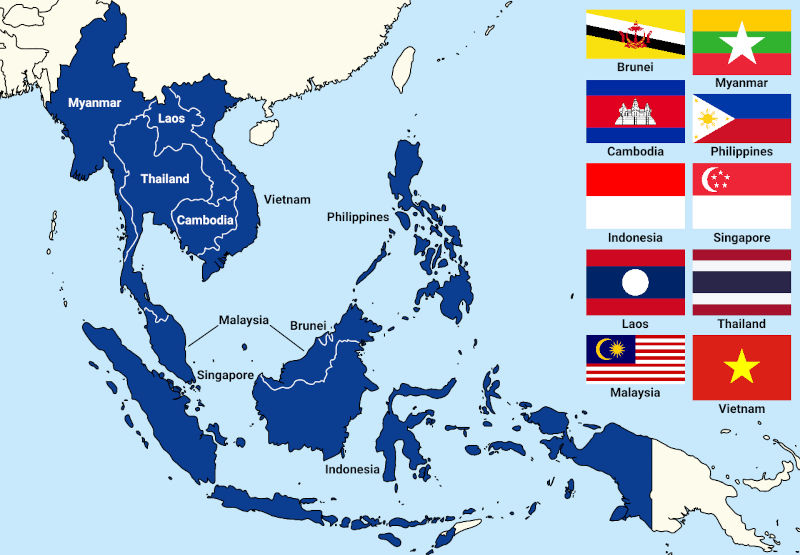ASEAN can add momentum to Australias call for US-China detente
February 10, 2024
Australias former foreign minister Bob Carr and 49 others are supporting an appeal for easing of hostility between the two superpowers. The Asean leaders meeting in Melbourne could provide a platform for discussions on peace security and boosting areas of cooperation with China and the US.
A congregation of Asean leaders in March could prove timely in providing an impetus to a detente between the United States and China called by a group of notable Australians, a former minister has said.
Bob Carr, Australias former foreign minister, and 49 ex-statesmen and politicians as well as academics and advocates on Wednesday called for the establishment of a detente or an easing of hostility or strained relations between the US and China to avoid the possibility of Australia being dragged into conflict.
It follows the detente struck between the US and the Soviet Union in the 1970s that led to arms control agreements and easing of political tensions between the superpowers, and was critical to averting the escalating danger of nuclear war at that time.
It is now when relations between the US and China are less alarming compared with a year ago that no country should be complacent, according to both Carr and former foreign minister Gareth Evans, who is also a signatory.
Others who have joined the call for detente include former diplomats John Menadue, Alison and Richard Brionowski, ex-politicians Bob Brown and John Hewson, as well as human rights lawyer Greg Barns and economist Saul Eslake.
In a statement, they said they were concerned tensions between Australias closest ally and key trading partner might lead to direct military conflict, which would risk dragging Australia into war.
While a detente was not easily achieved, it could reduce those threats and potentially bring about cooperation between the two superpowers in tackling global issues such as the war in Ukraine and cyber regulation.
How the detente takes shape can also be influenced by conversations that Australia has with other regional leaders, who have also expressed their interest in peace security, according to Carr.
The early March meeting of leaders of the Association of Southeast Asian Nations in Melbourne could provide a platform for these discussions, he added. The leaders will attend the Asean-Australia Special Summit to celebrate 50 years since Australia became the blocs first dialogue partner.
Asean leaders want to talk to Australia and all their other partners about peace and security in the region, Carr said. The overwhelming sentiment in Southeast Asia is that areas of collaboration between China and the US ought to be enhanced, and both sides ought to minimise the risk of war.
It is a very valid subject for discussion with not just Asean leaders but with Australias Asian partners in the Quadrilateral Security Dialogue, Japan and India, who both appear to want to contain the chances of conflict between America and China.
Australia, Japan, India and the US are members of the Quadrilateral Security Dialogue.
Australian Prime Minister Anthony Albanese said last year the Asean summit would facilitate both diplomatic bilateral meetings and business forums.
Aseans position on the US-China rivalry is that it will not be a proxy to any powers or take sides. However, it has not stepped up to serve as a bridge and geopolitical buffer between the two countries.
The call for detente now is deliberate, according to Carr and Evans.
Even with less tension, the US-China strategic competition remained very real and that provided a setting for potential flashpoints in the Asia-Pacific, they said.
All this means that the time is ripe for reinforcing and consolidating the recent gains to ensure that they are not just fleeting and transitory, they said.
The US and China should commit towards living cooperatively, with neither claiming to be top dog, they added.
Australia could play a key role in the detente given its experience in activist middle-power diplomacy, as shown by the establishment of the Canberra Commission on the Elimination of Nuclear Weapons in 1995 among others, the group of 50 said.
But they agreed Australia should maintain a strong defence policy, as supporting a detente was not about pacifism or appeasement.
For too long, Australia has avoided taking a practical policy position on the relationship between the US and China. Its not possible to continue to play war games with the Americans and trade games with China and hope to live on in blissful prosperity, Carr said.
Republished from the South China Morning Post, January 31, 2024
P&I Recommends:
https://publish.pearlsandirritations.com/australians-join-call-for-usa-china-detente/
